Afternoon Light
Welcome to the Afternoon Light Podcast, a captivating journey into the heart of Australia’s political history and enduring values. Presented by the Robert Menzies Institute, a prime ministerial library and museum, this podcast illuminates the remarkable legacy of Sir Robert Menzies, Australia’s longest-serving prime minister. Dive into the rich tapestry of Menzies’s contemporary impact as we explore his profound contributions on the Afternoon Light Podcast. Join us as we delve into his unyielding commitment to equality, boundless opportunity, and unwavering entrepreneurial spirit. Our engaging discussions bring to life the relevance of Menzies’s values in today’s world, inspiring us to uphold his principles for a brighter future. Ready to embark on this enlightening journey? Experience the Afternoon Light Podcast now! Tune in to explore the past, engage with the present, and shape a better tomorrow by learning from the visionary leadership of Sir Robert Menzies. Stay connected by signing up on the Robert Menzies Institute website: https://www.robertmenziesinstitute.org.au/. Have an opinion? Email your comments to: info@robertmenziesinstitute.org.au.
Episodes
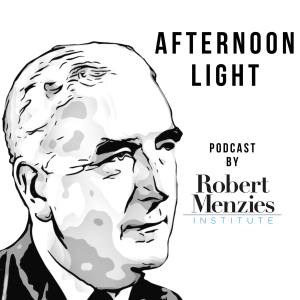
Wednesday Jun 28, 2023
Wednesday Jun 28, 2023
The first Liberal leader to win a Federal election outright was not Robert Menzies, it was in fact a little-remembered prime minister named Joseph Cook. Remarkably, Cook was also the first leader of the NSW Labor party and his story reveals the how and the why of the emergence of the Australian party system, and the philosophical lines of cleavage which continue to shape our nation. Born in an English coal mining town in 1860, Cook entered the mines as a pit boy at just age nine, and his life is a remarkable tale of human agency and Australian social mobility. It was this lived experience of opportunity and success which ultimately turned Cook into a powerful and persuasive advocate of the enduring values of Australian liberalism.
In this week’s episode of the Afternoon Light podcast, Robert Menzies Institute CEO Georgina Downer talks to Zachary Gorman, author of a new biographical monograph on Australia’s sixth prime minister Joseph Cook.

Wednesday Jun 21, 2023
Wednesday Jun 21, 2023
Despite being the home of the central institution of Australian democracy, Canberra was long denied its own democratic rights. Initially envisaged as a seasonal town where people would only come when Parliament sat, even once it became a fully-fledged city and national showpiece, federal governments were keen to control it so they could fashion that showpiece how they pleased. It was only in the 1980s, under the greater imperative of cost efficiencies for the federal budget, that the ACT gained its own legislature, and ever since it has maintained a distinct political culture quite unlike the rest of the country.
In this week’s episode of the Afternoon Light podcast, Robert Menzies Institute CEO Georgina Downer talks to Gary Humphries AO about the ACT’s political history.

Wednesday Jun 14, 2023
Wednesday Jun 14, 2023
Enter any Australian bookshop over the last couple of decades, and you are likely to have been inundated with publications written by politicians trying to tell their life story, spill gossip and throw barbs at their colleagues. However, this was not always the case. For most of the 20th century Australian politicians were generally reluctant to write memoirs, and even when they did, someone as jovial an interesting as George Reid managed to produce a frightfully dull and dreary volume. It is only quite recently that a culture of decorum and statesmanship that prevented politicians from speaking candidly in retirement, has given way to a frenzy of honesty, or at least self-justification.
In this week’s episode of the Afternoon Light podcast, Robert Menzies Institute CEO Georgina Downer talks to Joshua Black, from the ANU’s National Centre of Biography, about the phenomenon of Australian political memoir.

Wednesday Jun 07, 2023
Wednesday Jun 07, 2023
It was under Robert Menzies that Australia entered the nuclear age with the opening of the Lucas Heights Reactor in 1958. 65 years on, what looked to be the first step in a much bigger story remains practically the only step Australia has taken towards harnessing the potency of the atom to power our nation. As nuclear energy once again appears on the political radar, it is worth taking a look back and seeing what potential Australians once saw in nuclear and what could have been.
In this week’s episode of the Afternoon Light podcast, Robert Menzies Institute CEO Georgina Downer talks to Dr Michael de Percy about how Menzies represents Australia’s unrealised nuclear potential.

Wednesday May 31, 2023
Wednesday May 31, 2023
Bob Santamaria is a key figure in the Menzies era. Despite being little known until the mid 1950s, Santamaria’s role as the driving force behind ‘the Movement’ helped to thwart communist influence in the Australian trade unions and precipitate the great Labor split. Though he became a highly visible public commentator in his later years, the man himself remains something of a mystery, having provided contradictory autobiographies and propounding eccentric political ideas. While Santamaria proudly boasted that he never voted Liberal, in Menzies’s retirement, the two Bob’s would often share a drink and a warm chat in Menzies’s Malvern home.
In this week’s episode of the Afternoon Light podcast, Robert Menzies Institute CEO Georgina Downer talks to Gerard Henderson, author of two books on B.A. Santamaria, a central figure behind the 1950s Labor split.

Wednesday May 24, 2023
Wednesday May 24, 2023
Since the record-breaking run of Robert Menzies, there have been 14 leaders of the Liberal Party of Australia. Each of them has been influenced in various ways by the party’s founder, as they try to take up the essential task of upholding the principles of Australian liberalism (which indeed is a political tradition which long predates Menzies himself). In this special series of the Afternoon Light podcast, we intend to speak to each of the surviving leaders of the party about their connection to Menzies, philosophical beliefs, and time spent heading the centre-right of Australian politics.
In this week’s episode of the Afternoon Light podcast, Robert Menzies Institute CEO Georgina Downer talks to Dr Brendan Nelson AO, Leader of the Liberal Party of Australia between 2007-8, about his beliefs and experiences in the role.
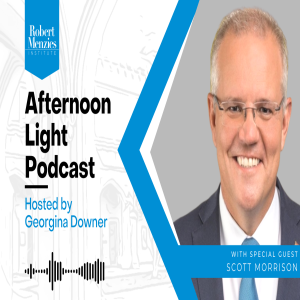
Wednesday May 17, 2023
Wednesday May 17, 2023
Since the record-breaking run of Robert Menzies, there have been 14 leaders of the Liberal Party of Australia. Each of them has been influenced in various ways by the party’s founder, as they try to take up the essential task of upholding the principles of Australian liberalism (which indeed is a political tradition which long predates Menzies himself). In this special series of the Afternoon Light podcast, we intend to speak to each of the surviving leaders of the party about their connection to Menzies, philosophical beliefs, and time spent heading the centre-right of Australian politics. In this week’s episode of the Afternoon Light podcast, Robert Menzies Institute CEO Georgina Downer talks to Scott Morrison, Prime Minister and Leader of the Liberal Party of Australia between 2018-2022, about his beliefs and experiences in the role.
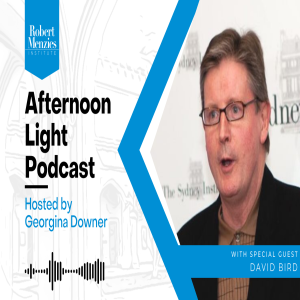
Wednesday May 10, 2023
Wednesday May 10, 2023
If one were to rank Australia’s most important Prime Ministers, Joseph Lyons would have to be high on the list. Not only did he lead the nation out of the Great Depression, but he was also responsible for readying the country for World War Two, presiding over five separate re-armament programs before passing away in office in 1939. Lyons’s personal journey is fascinating, as he not only went from being a Labor Tasmanian Premier to a centre-right PM, but the reason he did so was because he had been forever scarred by his father’s decision to bet the family’s resources on the Melbourne Cup. Plunged into poverty by this act of recklessness, he held that budgets must be balanced and debts repaid as an article of deep conviction. In this week’s episode of the Afternoon Light podcast, Robert Menzies Institute CEO Georgina Downer talks to David Bird, who has written two books relating to Joseph Lyons, the PM under whom Menzies deputised.
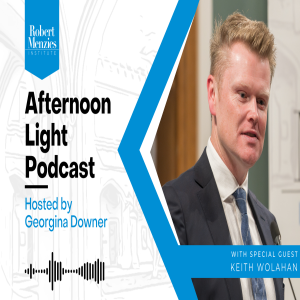
Wednesday May 03, 2023
Wednesday May 03, 2023
The Korean War is in many respects the war that never ended. This year marks 70 years since the signing of the Armistice Agreement which ended the three-year conflict in which 339 Australians lost their lives serving as part of a United Nations force which defended South Korea from an invasion from the Communist North. The conflict was the first clear flare up of the Cold War in the Asia-Pacific and the first to which the Menzies Government committed Australian ground troops. While the armistice served as an acknowledgement of a hard-fought stalemate in which the border between the two Koreas ended up in virtually the same place it had been at the outbreak of hostilities, the respective sides have never signed a full peace treaty, and tensions between North Korea and the West remain high to this day. In many respects the conflict is a lesson that history never ends, and that the maintenance of international peace and security is a constant work in progress. In this week’s episode of the Afternoon Light podcast, Robert Menzies Institute CEO Georgina Downer talks to Keith Wolahan MP, Australian Army veteran and the Member for Menzies, about the Korean War and its contemporary legacy.
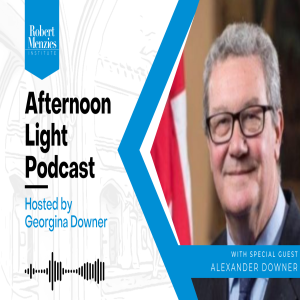
Wednesday Apr 26, 2023
Wednesday Apr 26, 2023
Since the record-breaking run of Robert Menzies, there have been 14 leaders of the Liberal Party of Australia. Each of them has been influenced in various ways by the party’s founder, as they try to take up the essential task of upholding the principles of Australian liberalism (which indeed is a political tradition which long predates Menzies himself). In this special series of the Afternoon Light podcast, we intend to speak to each of the surviving leaders of the party about their connection to Menzies, philosophical beliefs, and time spent heading the centre-right of Australian politics. In this week’s episode of the Afternoon Light podcast, Robert Menzies Institute CEO Georgina Downer talks to Alexander Downer, leader of the Liberal Party 1994-5, about his political beliefs and experiences in the role.









